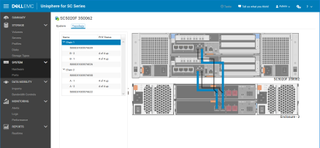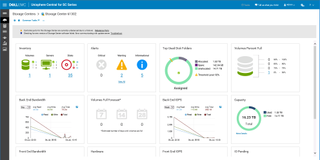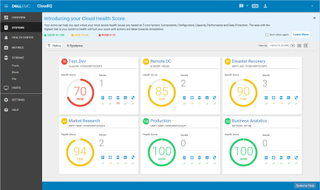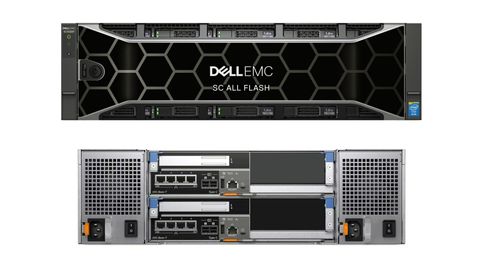IT Pro Verdict
The SC5020F is a great choice for mid-sized businesses that want a high performing all-Flash array at a sensible price and solid guarantees that it will deliver in the long term
Pros
- +
Low all-flash prices; Great performance; Swift deployment; Automated data tiering; 3-year satisfaction guarantee
Cons
- -
Multiple management consoles needed to access all features
Dell EMC aims to retake the mid-range storage market with an 'aggressive counter-attack' on the competition. In a bold pincer movement, it has updated its entire SC storage array family and introduced a future-proof storage loyalty program with 3-year satisfaction and efficiency guarantees.
Along with a hardware refresh across its hybrid SC arrays, it introduces two new all-Flash models and in this exclusive review, we look at the SC5020F. This was provided with the latest SCOS 7.3 software which delivers improved performance, higher storage capacities and new management features.
The SC5020F comes as standard with every advanced feature enabled with a perpetual license. The line-up is impressive and includes intelligent deduplication and compression, storage federation, data progression, RAID tiering, thin snapshots, replication, all management tools and much more.
Dell EMC SC5020F: Hardware
The SC5020F employs a 3U rack chassis with dual, active/active hot-plug controllers. Each is equipped with an octa-core 2.4GHz Xeon E5-2630 v3 CPU and 64GB of DDR4 cache memory.
It supports up to 30 internal SFF SSDs and can be expanded hugely outside the box. Using SC420F 24-bay SAS3 expansion shelves, the drive count can be pushed to 222 per array and more when configured as a federated array with up to 10 members.
Each controller comes with four 10GBaseT data ports plus PCI-Express and mezzanine card slots. Dell EMC now offers 100GbE as well as 10GbE and 25GbE adapters plus 8/16Gbps and 32Gbps FC options.
The SC5020F supports read- and write-intensive SSDs and Dell EMC advised us it expects most customers to be using it to handle read intensive workloads. To this end, our review system came with 30 1.92TB read-intensive SAS3 SSDs spread equally across the head unit and an SC420F expansion shelf.

Dell EMC SC5020F: SCOS standard features
The SC5020F supports two storage tiers of read- and write-intensive SSDs and SCOS uses profiles to control which tiers data should reside on and how data progression is managed. RAID array creation is automatic as SCOS selects them to suit each tier with options for RAID0, 5, 6, 10 and dual-mirrored arrays.
Physical storage is amalgamated into a Disk Folder pool within which virtual volumes are created and mapped to selected data ports. Storage profiles determine when data tiering occurs and its scheduler can be used to run this as often as every five minutes.
Profiles apply deduplication and compression which can be enabled globally or on selected volumes. Quality of service (QoS) profiles limit available bandwidth to selected volumes and can use IOPS or MB/sec values or both together.
Dell EMC SC5020F: SCOS 7.3 new features
Distributed sparing is designed to avoid wasted space on high-value, high-capacity SSDs. Our 1.92TB read-intensive SSDs are certainly far too pricey to use as global hot-spares sitting idle in standby.
Distributed sparing takes advantage of the fact that SC arrays manage RAID protection at the page level. This allows it to take capacity from multiple in-use SSDs and present it as a reserved rebuild space. Along with the cost advantage of having all SSDs in active service, it offers up to a five-fold reduction in array rebuild times.
The Live Volume feature allows volumes to be replicated between SC arrays and SCOS 7.3 increases the number supported from 100 to 500. It now uses the same volume ID between arrays for seamless failover and adds ALAU (asymmetric logical access unit) support allowing MPIO connections to the primary Live Volume to be advertised as optimal and those to the secondary one as non-optimal for failover purposes.

Dell EMC SC5020F: Management
SCOS 7.3 delivers enhanced management features with the Unisphere for SC web server running on both controllers for failover. It presents a well-designed HTML5 interface offering easy access to the array's local storage features.
Next up is the Unisphere Central for SC which runs on a VMware host and manages multiple SC arrays from a central web console. Dell EMC's DSM software gets an update to a 2018 R1 version and you'll need to run this as it can do things that Unisphere for SC can't, such as configuring the Live Migrate and Live Volume functions.
The free CloudIQ cloud-based app shows the status of all arrays and provides health information. It uses call-home data from each array to build up a health picture and after logging in with your Dell EMC support credentials, you can view lists of service actions that need to be performed.
Dell EMC SC5020F: Performance
We focused our performance testing on virtualized environments and used dual Dell EMC PowerEdge R840 Xeon Scalable rack servers running VMware ESX 6.5 and configured as a single cluster. These were connected to the SC5020F via sixteen 16Gbps FC ports and eight VMs were created on the ESX cluster with each running Linux CentOS.
On the SC5020F, we created a total of 32 all-flash volumes which four assigned to each Linux VM. We loaded Iometer on a dedicated Windows Server host, ran the Dynamo load generator remotely on each VM and declared them to Iometer.
Using Iometer 512KB block sizes, we watched our test rig return a total raw sequential read throughput of 13,100MB/sec. Moving to random operations saw a slight increase in throughput to 13,175MB/sec.
Changing to a 4KB block size saw a random read throughput of 410,000 IOPS. Our workload test used the same block size with an 80/20 random read/write distribution and this returned an equally impressive 280,000 IOPS.

Dell EMC SC5020F: Verdict
The SC5020F is very competitively priced for mid-sized businesses and with every advanced storage feature included, there are no worries about future investment in extra licenses. Available as a free update to existing SC customers, SCOS 7.3 also delivers an extensive range of new features and performance improvements.
The Unisphere management tools are a welcome addition although we found the DSM app will still be required for some storage configuration tasks. The SC5020F is easy to deploy and delivered good performance on our lab tests while Dell EMC's 3-year storage efficiency and satisfaction guarantees will provide that all-important peace of mind.
Verdict
The SC5020F is a great choice for mid-sized businesses that want a high performing all-Flash array at a sensible price and solid guarantees that it will deliver in the long term
Chassis: 3U rack
Storage: 30 x SFF hot-swap drive bays
Power: 2 x hot-plug 1485W PSUs
Cooling: 2 x hot-plug fan modules
Dual hot-swap controllers each with the following:
CPU: 2.4GHz 8-core Xeon E5-2630 v3
Memory: 64GB DDR4
Array support: RAID 0, 1, 5, 6, 10, 10 DM
Storage (SC5020F): 15 x 1.92TB SSDs
Storage (SC420F): 15 x 1.92TB SSDs
Max storage: 222 drives per array
Expansion: 1 x PCIe slot, 1 x mezzanine slot
Network: 4 x 10GBaseT, 16 x 16Gbps FC, Gigabit management
Software: Dell SCOS 7.3
Management: Unisphere for SC, Unisphere Central for SC, Dell EMC Storage Manager 2018 R1
Dave is an IT consultant and freelance journalist specialising in hands-on reviews of computer networking products covering all market sectors from small businesses to enterprises. Founder of Binary Testing Ltd – the UK’s premier independent network testing laboratory - Dave has over 45 years of experience in the IT industry.
Dave has produced many thousands of in-depth business networking product reviews from his lab which have been reproduced globally. Writing for ITPro and its sister title, PC Pro, he covers all areas of business IT infrastructure, including servers, storage, network security, data protection, cloud, infrastructure and services.



